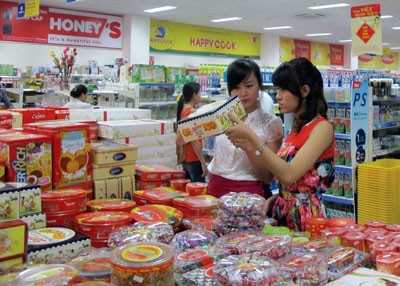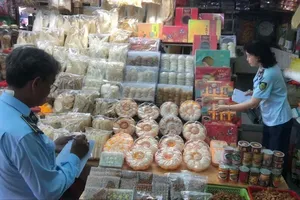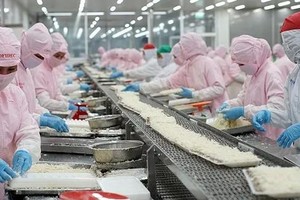At most grocery stores, supermarkets, and trade centers in Ho Chi Minh City, foreign-made products outnumber domestic-made goods and remain more popular as supermarkets and trade centers continue to import them, even though these can be produced locally.

At M. Supermarket on 3 Thang 2 Street in District 10, many household goods, such as ladles, kettles, and electric mugs, have been imported from China, South Korea, and Japan. Even mops, towels, cradles, and makeup remover cotton pads are from foreign countries although in reality, local producers are capable of producing these same items.
Not only household goods, but foodstuffs also out price domestically made commodities. For instance, Thailand tamarind is priced around VND90,000 per kilo, and Thailand wafers are priced VND21,000 per three pieces, at M. supermarket.
Similarly, L. Supermarket on Le Dai Hanh Street in District 11 is also flooded with foreign-made toys and fresh food products. Local products merely account for a modest number. As for instant noodles, shelves are full of instant noodles imported from South Korea and Thailand. Of course, the price of instant noodles from South Korea is fairly higher, from VND20,000 to VND40,000 per pack, while price of other kinds of instant noodles is around VND10,000 per pack.
Bookstores cum mini-supermarkets, including M.K and T.N also display many kinds of pens, glasses imported from China and Thailand from VND200,000 to VND300,000 per item, depending on product and brand name.
Electronics supermarkets, such as N.K, P.K, and P.V, sell cases for mobile phones and laptop cooling pads from VND200,000 to VND2 million per item. Noticeably, all these products have Chinese and Taiwanese origin markings.
There are just a few supermarkets where Vietnamese products account for 80-90 percent of the total amount of goods. But supermarkets where foreign goods are sold are easy to find and it is out of question if these foreign products cannot be replaced by local-made ones.
In fact, many foreign products can be totally replaced by local products. It is said that xenophile of consumers and poor competitiveness of local producers have created favorable conditions for foreign products to crush the domestic market.
























